A
tale about Martin Overlock, whose
parents came from Germany to the old
Broad Bay Settlement, now called
Waldoboro, Maine, was recorded in an
article in The Republican Journal,
a Belfast, Maine newspaper, copied
from a Bucksport, Maine newspaper,
called ‘Bucksport Clipper‘. The
article was written sometime in the
1880’s, and entitled, “A Smart Old
Gentleman”. A few years later, the
newspapers carried his obituary.
Martin
Overlock had been interviewed by a
reporter, who apparently was intrigued
by the aged man and his stories. He
was born Jan. 16, 1788, in
Waldoborough, the son of John Joseph
and Christiana (Alston) Overlock. When
he was a child, between the ages of
nine and twelve, the family moved to
Washington, Me.
Martin
served in the War of 1812, proud of
his service to the Country, from which
he received a small government
pension.
About
1813, at the age of twenty-five years,
Martin settled in South Liberty, being
the earliest settler there. He built a
crude structure back in the pasture.
Five years later, in Feb. 1819, he
married Mehitable Goodspeed of
Vassalboro, the daughter of Amasa and
Elizabeth (Robinson) Goodspeed.
Life
was hard in those days. Martin and
Mehitable had a family of thirteen
children, twelve of whom lived to
adulthood. They also raised a
grandson.
After
Mehitable’s death in May 1868, Martin,
at age eighty-one, married a
twice-widowed woman, Adeline Burns,
whose first husband had been Gardner
Meservey, and second husband, Benjamin
Burns. Adeline lived but six years
after her marriage to Martin. After
Adeline’s death, Martin gave up
working. He lived with and was cared
for by his son, Frank, who had built
the frame house on the old homestead.
Martin’s daughter, Julia and John C.
Hannan lived nearby.
Martin
enjoyed telling stories of his long
life. He told the reporter of the time
when he was a boy, of hearing a pig
squealing. The family went to
investigate, and found that a bear was
carrying the pig off into the woods.
His father got his gun, his sister
Jennie carried a lit torch, and they
followed the bear, overtaking it
within a half mile of the house. His
father shot the bear, and rescued the
pig, which was quite unharmed.
Martin
related that he had come from a
long-lived race, and from a large
family. His deceased siblings had
lived to be nearly eighty years of
age, but he had far surpassed that
age. When he was a young man, he
attended the musters in Town. In those
days he was a rugged young man and a
champion wrestler, termed a ‘bully’.
Martin’s
son, Frank, with whom he lived, could
not recall when his father’s hair was
anything but snow white. But in the
last two years of his life, his hair
turned gray, and then nearly all
black, in some places jet black.
Martin
was a strictly temperate man, and a
firm Christian. When he could no
longer work, he read the German Bible
through seven times. He spoke German
as well as English, and repeated
German prayers daily. He had always
been a healthy, strong man, never
seeing a doctor until his last
illness.
Martin
had been a kind, loving husband, a
tender and affectionate parent and
friend who was loved and respected by
all who knew him, though he was also
known as being a strict
disciplinarian. He had longed for
death’s release for several years
before his death, though he was as
patient as a man of his advanced years
could expect to be. He longed for the
life he read of in his Bible, and to
join his wives and children who had
gone on before him.
On
Sunday morning, July 29, 1888, as the
clock tolled the hour of eight,
Martin’s spirit calmly took its flight
back to the God who had given it. He
was aged one hundred years, six months
and thirteen days. He had lived a
long, eventful and happy life, dying
on the farm that he had homesteaded so
many, many years before. He left
fifty-two living grandchildren,
sixty-eight great-grandchildren, and
four great-great-grandchildren as his
legacy. Just one month after Martn’s
death, his son, Frank, with whom he
had lived, also passed on.
Martin’s
funeral, held at the Moody Schoolhouse
in South Liberty, Maine, conducted by
Rev. E. C. Shattuck of Washington, Me.
was attended by family, many friends,
and neighbors, some that he had known
for many, many years. He was buried
with Mehitable in the Moody-Hannan
Cemetery in South Liberty.
Now
jump ahead one hundred and twenty
years to the Moody-Hannan Cemetery in
South Liberty. One day last fall, Bob,
a descendant of Martin Overlock, and I
were coming up Route 220 from the feed
store in Washington, Me. when we
chanced to stop at the cemetery.
Stepping through the entrance to the
side-hill on which the cemetery is
located, I was appalled and
speechless. The cemetery looked like a
war zone. Trees were down and broken,
as were gravestones. It is hard to
determine if the trees have done all
of the damage, or if vandals have also
been present.
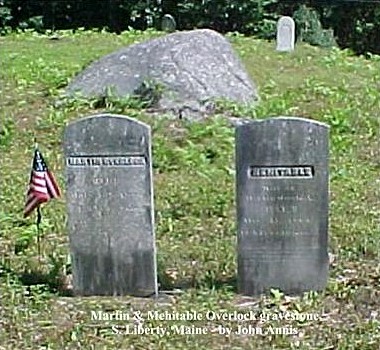 The
gravestones of Martin and Mehitable
Overlock, which stood proudly for well
over one hundred years were flat on
the ground, his broken perhaps beyond
repair. These stones were standing at
least four years ago, with pictures to
prove it.
The
gravestones of Martin and Mehitable
Overlock, which stood proudly for well
over one hundred years were flat on
the ground, his broken perhaps beyond
repair. These stones were standing at
least four years ago, with pictures to
prove it.
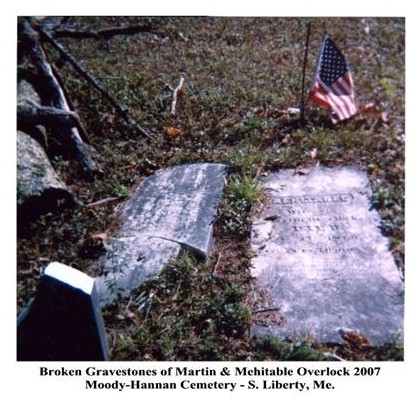
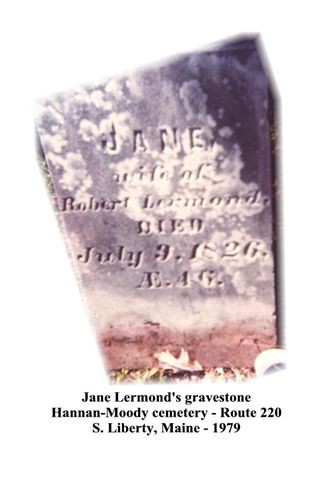
Who
is responsible to clean up such
carnage? It is a shame for any society
to allow such a thing to happen. There
is a law on the books of the State of
Maine, that if a veteran is buried in
any cemetery, an individual can sue
the Town to keep the burial ground in
good order. Martin Overlock was a
veteran of the War of 1812, receiving
a pension. John Colby Hannan, also
buried in the cemetery was a veteran
of the Civil War, also receiving a
pension. I’m sure that many others
buried in the cemetery are veterans.
Away up in the south corner are buried
my ancestors, the Lermond family, who
had been neighbors to the Hannans and
Overlocks. Two of the Lermond
children’s gravestones, which had been
missing before when I was in the
cemetery were standing against the
stone wall.
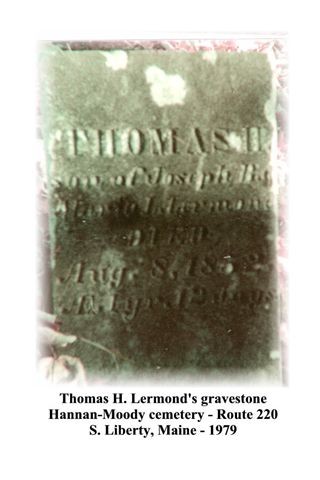
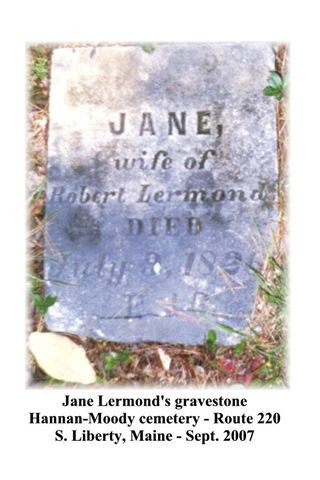
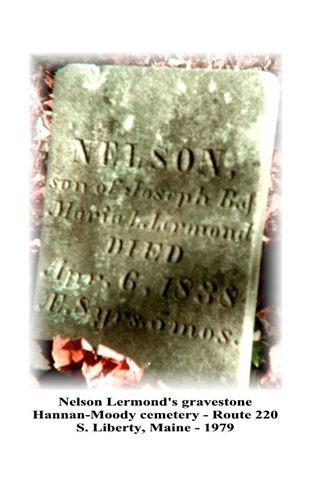
.jpg)
This
little cemetery has not been in the
best of condition for a few years, but
what I observed last Fall was
disgraceful. I would hope that some
descendants might band together to
make this again, what it must have
been valued to the valiant ancestors
who are buried there.
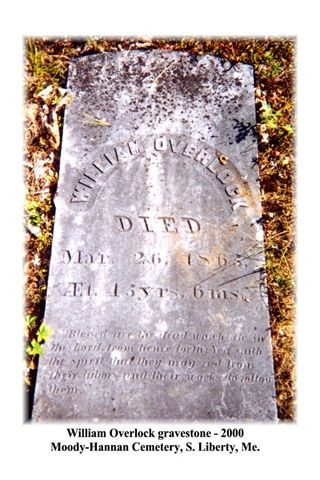
.jpg)
William
Overlock's Gravestone in 2007

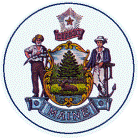
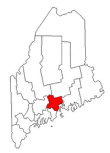
 The
gravestones of Martin and Mehitable
Overlock, which stood proudly for well
over one hundred years were flat on
the ground, his broken perhaps beyond
repair. These stones were standing at
least four years ago, with pictures to
prove it.
The
gravestones of Martin and Mehitable
Overlock, which stood proudly for well
over one hundred years were flat on
the ground, his broken perhaps beyond
repair. These stones were standing at
least four years ago, with pictures to
prove it.




.jpg)

.jpg)